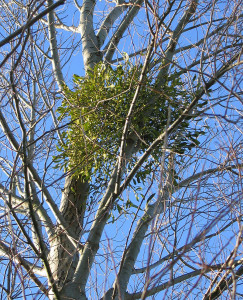Viscum Album is a species of mistletoe in the family Santalaceae, commonly known as European mistletoe, common mistletoe or simply as mistletoe (Old English mistle). It is native to Europe and western and southern Asia.
Contents
Uses
Viscum Album leaves and young twigs are used by herbalists, and preparations made from them are popular in Europe, especially in Germany, for attempting to treat circulatory and respiratory system problems. Use of Viscum Album extract in the treatment of cancer originated with Rudolf Steiner, the founder of Anthroposophy.
Although laboratory and animal experiments have suggested that mistletoe extract may affect the immune system and be able to kill some kinds of cancer cells, there is little evidence of its benefit to people with cancer.
Benefits
Interest in Viscum Album for cancer has grown in North America, ever since Suzanne Somers announced on Larry King Live that she is using it to treat her breast cancer. European mistletoe has been used for treating cancer since the 1920s, especially in Europe. Several brand name mistletoe extracts are available there: Iscador, Eurixor, Helixor, Isorel, Vysorel, and ABNOBAviscum. So far these products are not readily available in North America. There is no proof they work for breast or other cancers. Avoid these products and stick with proven cancer treatments.
European mistletoe is also used for heart and blood vessel conditions including high blood pressure, “hardening of the arteries” (atherosclerosis), internal bleeding, and hemorrhoids; epilepsy and infantile convulsions; gout; psychiatric conditions such as depression; sleep disorders; headache; absence of menstrual periods; symptoms of menopause; and for “blood purifying.”
Some people use European mistletoe for treating mental and physical exhaustion; to reduce side effects of chemotherapy and radiation therapy; as a tranquilizer; and for treating whooping cough, asthma, dizziness, diarrhea, chorea, and liver and gallbladder conditions.
European mistletoe injections are used for cancer and for failing joints.
Cautions
“Auto-immune diseases” such as multiple sclerosis (MS), lupus (systemic lupus erythematosus, SLE), rheumatoid arthritis (RA), or other conditions: European mistletoe might cause the immune system to become more active, and this could increase the symptoms of auto-immune diseases. If you have one of these conditions, it’s best to avoid using European mistletoe.
Heart disease: There is some evidence European mistletoe might make heart disease worse. Don’t use it if you have a heart problem.
Leukemia: Some test tube studies suggested European mistletoe might be effective against childhood leukemia. But benefits have not been shown in people. In fact, European mistletoe might make leukemia worse. If you have leukemia, don’t take European mistletoe.
Liver disease: There is some concern that taking European mistletoe might harm the liver. In theory, European mistletoe might make liver diseases, such as hepatitis, worse. People with liver disease or a history of liver disease should avoid European mistletoe.
Organ transplant: European mistletoe might make the immune system more active. This would be a problem for people who have received an organ transplant. A more active immune system might increase the risk of organ rejection. If you have had an organ transplant, avoid European mistletoe.
Surgery: European mistletoe might affect blood pressure. There is a concern that it might interfere with blood pressure control during and after surgery. Stop taking European mistletoe at least 2 weeks before a scheduled surgery.
Interactions
- Medications for high blood pressure (Antihypertensive drugs) interacts with Viscum Album
European mistletoe seems to decrease blood pressure. Taking European mistletoe along with medications for high blood pressure might cause your blood pressure to go too low.
Some medications for high blood pressure include captopril (Capoten), enalapril (Vasotec), losartan (Cozaar), valsartan (Diovan), diltiazem (Cardizem), Amlodipine (Norvasc), hydrochlorothiazide (HydroDiuril), furosemide (Lasix), and many others.
- Medications that decrease the immune system (Immunosuppressants) interacts with Viscum Album
European mistletoe seems to increase the immune system. By increasing the immune system European mistletoe might decrease the effectiveness of medications that decrease the immune system.
Some medications that decrease the immune system include azathioprine (Imuran), basiliximab (Simulect), cyclosporine (Neoral, Sandimmune), daclizumab (Zenapax), muromonab-CD3 (OKT3, Orthoclone OKT3), mycophenolate (CellCept), tacrolimus (FK506, Prograf), sirolimus (Rapamune), prednisone (Deltasone, Orasone), corticosteroids (glucocorticoids), and others.
Other names
All-Heal, Banda, Birdlime Mistletoe, Blandeau, Bois de Sainte-Croix, Bouchon, Devil’s Fuge, Drudenfuss, Eurixor, Guérit-Tout, Gui, Gui Blanc, Gui Blanc d’Europe, Gui des Feuillus, Gui d’Europe, Gui Européen, Helixor, Herbe de Chèvre, Hexenbesen, Hurchu, Iscador, Isorel, Leimmistel, Mistlekraut, Mistletein, Mistletoe, Muérdago Europeo, Mystyldene, Nid de Sorcière, Pain de Biques, Rini, Verquet, Vert-Bois, Vert de Pommier, Visci, Visci Albi Folia, Visci Albi Fructus, Visci Albi Herba, Visci Albi Stipites, Vogelmistel, Vysorel
References
Wikipedia, https://en.wikipedia.org/wiki/Viscum_album#Alternative_medicine

